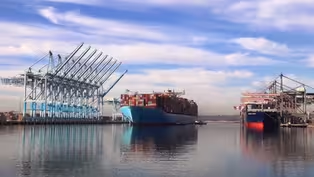
Globalization and Energy
Clip: Season 2 Episode 6 | 2m 47sVideo has Closed Captions
U.S. Secretary of Energy Ernest Moniz and others on the 1970s energy crisis.
An excerpt from 'Globalization.' U.S. Secretary of Energy Ernest Moniz and others on the 1970s energy crisis.
Problems playing video? | Closed Captioning Feedback
Problems playing video? | Closed Captioning Feedback

Globalization and Energy
Clip: Season 2 Episode 6 | 2m 47sVideo has Closed Captions
An excerpt from 'Globalization.' U.S. Secretary of Energy Ernest Moniz and others on the 1970s energy crisis.
Problems playing video? | Closed Captioning Feedback
How to Watch Power Trip: The Story of Energy
Power Trip: The Story of Energy is available to stream on pbs.org and the free PBS App, available on iPhone, Apple TV, Android TV, Android smartphones, Amazon Fire TV, Amazon Fire Tablet, Roku, Samsung Smart TV, and Vizio.
Buy Now
Providing Support for PBS.org
Learn Moreabout PBS online sponsorship(dramatic music) - [Narrator] The oil shocks of the 1970s caused many governments to question their own dependence on energy imported from across the world.
This led to a movement towards self-sufficiency also known as energy independence which was somewhat at odds with globalization.
- The point of having optionality, flexibility, resilience played out very, very clearly in that case.
- For at least the foreseeable future, we don't anticipate any major increase in the pipeline quantity of gas available to us.
- The response in the United States to the energy crisis was multifaceted.
There was the effort to switch from the large American automobiles.
- [Announcer] We must end our love affair with the big car.
- [Raj] There were efforts to reduce gas consumption by lowering the speed limit to 55 miles an hour, campaigns to reduce energy costs by keeping the lights off and keeping air conditioning off.
- We had a serious challenge to the modern American way of life, and just as importantly, it had a huge refocusing of the United States domestically on energy innovation.
We really started to double and triple down on basic investments in advanced fossil energy and eventually that resulted in the shale gas revolution and we found ways to more effectively harvest the energy of the sun and the energy of the wind.
- It contributed to inflation, and to fight inflation, the US had to raise interest rates ultimately.
- [Narrator] Oil prices continued rising.
Both Mexico and Venezuela had vast oil reserves and felt they would use the high prices to their advantage.
Countries in Latin America began to borrow money from international banks to finance public spending and the banks were eager to make those loans knowing that the countries had oil to sell to pay them back.
But skyrocketing inflation caused the United States to make changes to their monetary policy to fight inflation.
At the same time, a day of reckoning was coming for oil prices.
More efficient use of oil and hoarding created what was called an oil glut and the price of oil crashed.
This is Power Trip.
The Story of Energy.
Video has Closed Captions
Preview: S2 Ep6 | 30s | Learn how energy enabled rapid globalization. (30s)
Video has Closed Captions
Clip: S2 Ep6 | 2m 11s | Energy is critical to the Port of Los Angeles. (2m 11s)
Providing Support for PBS.org
Learn Moreabout PBS online sponsorship
- Science and Nature

Explore scientific discoveries on television's most acclaimed science documentary series.

- Science and Nature

Capturing the splendor of the natural world, from the African plains to the Antarctic ice.












Support for PBS provided by:

